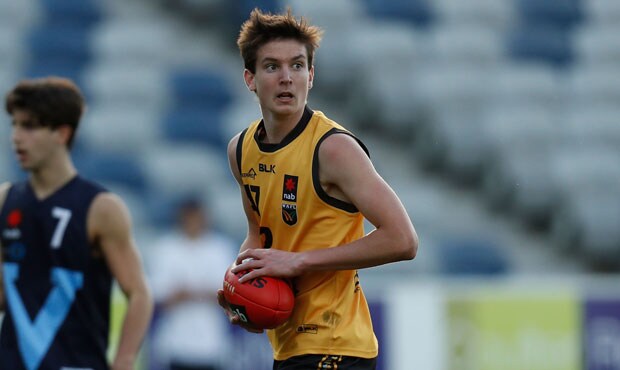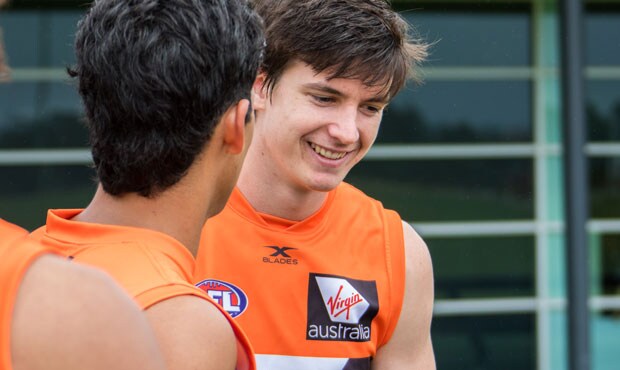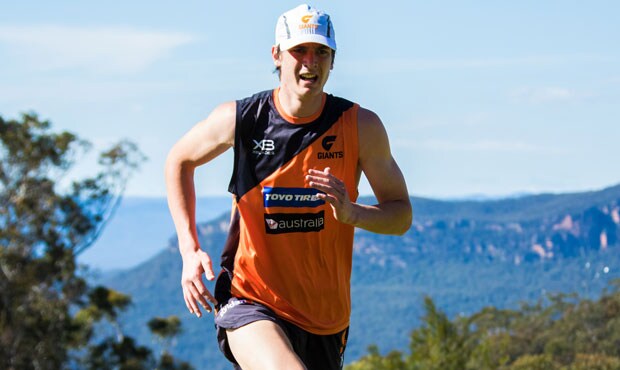Emma Quayle is an award-winning journalist and draft expert who spent 16 years covering AFL for The Age newspaper before joining the GIANTS’ recruiting team in February, 2017. As one of the industry’s most respected writers and talent spotters, Quayle has a unique perspective on the GIANTS’ recent crop of draftees. In the fourth of her insightful six-part series, Quayle sits down with selection 28, Sam Taylor.
Sam Taylor had played three games for the Swan Districts senior side, games he wanted to play but was never sure he would be given. He was still working out who everyone was, how they played and what they needed of him when he felt an elbow crash into his head during the very last drill at training one night, two days before game number four.
That weekend, Taylor felt things he had never really felt before. He was cautious, tentative, worried that if he threw himself around like he usually did then he might get hit again. He didn’t want any more blood, and he didn’t want any more stitches. He played an uncertain game, he only got the ball six times and he told himself he would probably be dropped.
It wasn’t a very good feeling. “I didn’t like it. Thinking back, maybe I shouldn’t have played, but I was still trying to find my spot in the team. I didn’t want to miss out playing that game and then have to do it all again,” Taylor said.
“I had blood everywhere on Thursday, and when I went into the game I was just softer than I should have been and not going as hard as I normally go. I sort of didn’t want to go for the ball and make it worse and get a bigger cut on my head. I just wasn’t very well prepared. I wasn’t myself, and instead of just smashing in I was thinking about it all too much.
“I didn’t do anything well, and I wanted to fix it. All week I was thinking they would probably drop me. I was really disappointed so I just decided to be more driven and work even harder and push myself all week. I did everything I could, I felt better and they said that they’d keep me in. Somehow I went out and just played my normal football again.”

Taylor touched the ball 27 times, that day. He read the ball well, he set up play from the backline, he grabbed eight marks and he played with the courage, initiative and gumption that had got him a game in the first place. It was the week he felt things start to click more completely with his senior teammates and he stayed in the team for another two weeks after that, playing last season out with them, finding out what the finals were like and feeling like a much better player for it.
He had come a long way. Taylor grew up on a property in Bullsbrook, a little under an hour north of Perth, trying out almost every sort of sport he could think of: cricket, basketball, athletics, tennis, pretty much everything except rugby. With five brothers – two older and three younger – and one little sister, he rarely ran short of company or someone to go up against. “It was…. competitive. It was always pretty rowdy at our place,” he said. “We were always trying to win, it didn’t matter who was there or what we were doing. Everything was a competition. My brothers were over the moon when I got drafted because I was gone and someone got to take my room.”
Football always mattered most, and was the reason Taylor moved to Guildford Grammar ahead of Year 8, “to be somewhere that was sporty, and also because of school. I knew I wanted to go to university and I knew I wanted to make the most of my football, so it was a good place to be.” He stayed involved there last year, helping coach the Year 7 team while starting a commerce course and spending a few nights away from home with a friend whose family lived closer to his university campus. “It was a good year for me, to learn how to be away from home a bit and to be more independent,” he said. “You have to be self sufficient at uni. You have to make your own mind up, not just be told what to do all the time. At school you’re told when to do something, how to do it and where to do it. I had to be a bit more grown up. It was good for me.”

Those few days away from home each week were a big deal, too, away from his brothers, his sister, his parents, the family farm and all that activity and noise “that I was used to being there, day after day. Fighting with each other, playing sport, doing whatever. When we all got home from school there was always something going on.” The senior games he played helped him find his own way a little more too; to fit into another new group, make some friends and show them all the things he could do was difficult at first but something he felt ready to take on. It was a time he had been waiting and planning for; when his dad installed a set of full sized goal posts in the backyard Taylor strung a piece of string across them because “it was as high as anyone can jump. So I needed to be able to jump up that high. And I needed to kick the ball over the top of it, too. Since I was a little kid, I just wanted to play football.”
This was an entirely new challenge though. “At the start of the year the team was winning almost every game and I was pushing as hard as I could but I didn’t have the confidence to think I could get in there and play,” Taylor said. “Even the week it happened, the Colts coach said it might be a bit longer and then the senior coach came over one night and just told me really casually that I was in.

“The first few weeks were a bit nerve-wracking, being around the boys and not knowing the game plan, but once I was out on the ground I wanted to build some trust, build that connection with the players and show them that I was someone who would do my best to be a good footballer and compete all the time. I wanted to use them and their experience to help make me better, in a way. But I wanted to be myself, and just go out there and play and prove myself. It will the same here I think, just being around good players and pushing myself and seeing how good I can be and showing what I can do.”



